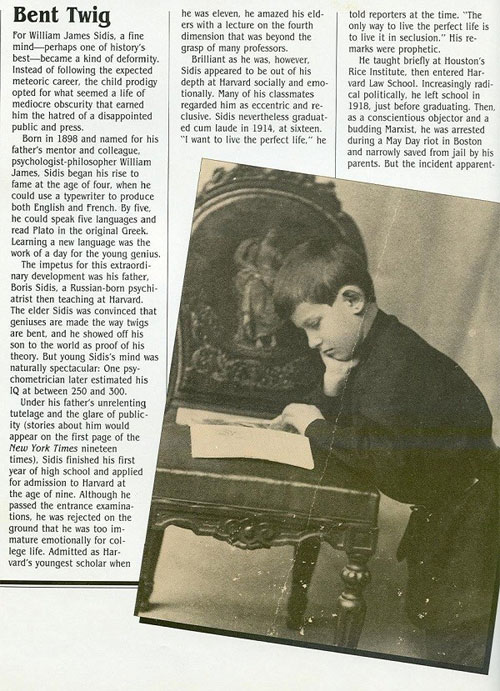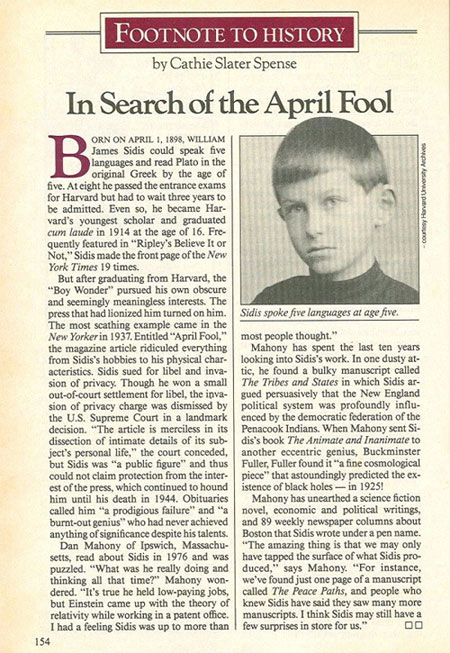The life of unfortunate prodigies in the twentieth century
The talent of these prodigies is revealed from a very young age . however they are buried and faded away.
The twentieth century witnessed the appearance of many prodigies with wisdom and talent far beyond human imagination. Many of them have become great people with outstanding achievements, but not many prodigies have to bury their abilities for many different reasons .
1. William James Sidis - the smartest person in world history
William James Sidis (1898 - 1944) was the son of a Jewish American couple, both his father and mother had outstanding intelligence. Mr. Boris, William's father, is a professor of psychology at Harvard University. And his mother, Sarah is a talented doctor.

Young William soon revealed his natural talent of wisdom: at 18 months, he was able to read the newspaper well; 2-year-old self-learning Latin; 3 can speak Greek and type the letters themselves. At the age of 8, he demonstrated a gifted mathematical talent by developing a new logarithm table based on number 12.
At age 9, William spoke at a space research conference at Harvard University. And two years later, the 11-year-old boy was honored to become the youngest student in the history of Harvard's prestigious university.

One of the articles is about William James Sidis
According to many professors at Harvard, from the age of 8, William had enough intelligence and knowledge to study at Harvard. But now his body shape "is not suitable" to qualify for University. Therefore, the school board decided, William had to wait another 3 years to study at this prestigious school.
Tests show that William's IQ is 250-300, recognized as the smartest person in the history of the world. In addition to his mathematical skills, he was fluent in 8 different languages and wrote many valuable scientific books .
William graduated from Harvard at the age of 16, four years later, he became professor of mathematics at Rice University (USA). But when so many students mocked, William gave up his teaching career and returned to Harvard to study law. And from here began a turbulent period in his life.

In 1919, William was arrested when participating in the anti-war parade in Boston. Sentenced to 18 years, William's father helped him out, but he made the wrong decision to take him to a psychiatric hospital for more than a year.
Because of the fear of his son going astray, William's mother and father constantly control, monitor and prohibit him from making friends with strangers. Too depressed, he gave up mathematics and switched to writing books. However, this path has become lost.
In 1925, he published a book on cosmology in which he predicted black holes in the universe but did not receive much support from scholars. William died of cerebral hemorrhage in 1944, when he was 46 years old.
2. Winfred Sackville Stoner Jr. - prodigy of art
Winfred Sackville Stoner Jr was born in Virginia in 1902 as her own son Winfred Sackville Stoner, a talented educator who founded the school of "teaching that is associated with children's happiness".

With her mother's attention and teaching, Stoner Jr. quickly revealed the natural talent of his language. Less than 8 years old, she translated many books into Spanish. At age 9, Stoner Jr passed a rigorous period to become a student of a prestigious university.
Not only that, at 12 years old, Stoner Jr. fluently communicated in 8 languages, thoroughly understood many instruments such as guitar, piano and composed many poems and novels of high literary value. .
Stoner Jr's intelligence gave her mother a big "bargain" . She shared the secrets of teaching children in a book called 'Natural Education' . Any parent who lived in the US at that time wished to have this book. In just a short time, Stoner Jr. and his mother became rich millionaires.

The book Natural Education, written by Stoner Jr's mother, has become one of the most famous teaching materials of all time.
Unfortunately, Stoner Jr has had an intellectual success as his intellectual. In 1921, she married when she was 19 years old with a Frenchman named Charles De Bruche.
This is a professional scammer who pretended to die in 1922 in Mexico to get life insurance from Stoner Jr. After learning the painful truth in 1930, she decided to remarry according to her wishes.
But the first marriage left Stoner Jr. a horrible wound, and within 3 years she was married and divorced with 3 men. Finally, after parting with his fourth fiancé EW Harrison, Stone Jr decided to live alone for the rest of his life in a remote, rural Virginia.
3. Nathalia Crane - the youngest poet in the world
Born in 1913 in the Brooklyn area, Nathalia Crane is one of the youngest poets the world is known for. Her first compositions immediately caught the attention of public opinion. At the age of 9, Crane poems were bought by The New York Sun for publication.
By the age of 10, this "small talent" created a hugely popular work at the time called 'Romance' , depicting the amazing adventure of a beautiful girl to the island of angels. .
By 1925, at the age of 12, Crane was elected an official member of the "American Art Association". Since then, every year, the poetic prodigy has regularly produced outstanding works. She quickly became the pride of the whole United States, many people also called the Crane: 'Brooklyn's golden child'.

But unlike many contemporary prodigies, Nathalia Crane no longer had a childish innocence, the old girl's way of thinking was like an adult. Nathalia Crane's interviews with journalists are always astute, wise, with a tone imbued with experience. In particular, she boldly shared her views on love, marriage, sex .
It was from this thought with "unbelievable" talent, that some poets suspected Crane's talent was just a trick. The poetry critic Edwin Markham said: 'A 12-year-old cannot have such a vast knowledge. Understanding in Crane poems stretching from historical, archaeological, love, marriage . It's really too much, I believe this is a combination of many individuals and Crane is only a representative '.
Some of the articles were more malevolent, trying to prove that Crane's parents were the owners of the works and the daughter was just a frontier to deceive public opinion.
Too tired of the attacks, Crane left the work of composing, the works less. Since becoming an English teacher at the University of San Diego, Crane has also won forever with poetry. Since then she has lived a frugal, humble way, always trying to stay away from the noise of society.
4. Elizabeth Benson - writing poetry from 3 years old
Elizabeth Benson was born in 1913 in Texas, USA. Anne Austin - her mother is a famous contemporary detective journalist and novelist. Perhaps hereditary literary talent, right 3 years old Elizabeth knew how to spell and began writing poetry.

With an IQ of 214, Elizabeth Benson has become world famous since she was eighteen. But her mother did not let her daughter comfortably interact with the media, she did not even let Elizabeth read. The newspaper sample praises this prodigy talent. Therefore, despite the brain of a professor, Elizabeth is extremely humble and progressive.
When she was 13 years old, she produced a very popular novel and received a scholarship from Barnard University in New York. She also showed her talent in sports.
During her college years, Elizabeth won a lot of gold medals, certificates of merit in volleyball, swimming, athletics. In a book she wrote, Elizabeth shared: 'Muscle activity will improve. the activity of the endocrine glands, helps the mind to stay alert and alert. '
The future of a genius is gradually brightening, Elizabeth chose another turn. This may be her own happiness, but it is frustration and "unhappiness" for those around her.
After graduating from college, this genius chooses a simple life with the person he loves. She did not participate in writing and studying activities, but became a sure wife and mother, loving her children.
There have been many newspapers and media criticizing and criticizing Elizabeth's selfishness when not devoting her mind to the country and society. But she still ignores everything to live happily with her family until she dies at the age of 80.
- Wolfgang Pauli - The great scientific face of the twentieth century
- Mysterious ancient book
- Life is full of events and the mysterious disappearance of a physical genius
- Legal movie download services to take off?
- How is HIV spread all over the world?
- The prodigies receive the youngest doctorate in history
- Heterosexuals of the entertainment industry in the early 20th century
- Stephen Hawking: Einstein's dream
- 'Einstein's stupid mistake'
- Predicting the future 50 years later
- YouTube is entangled in television rights
- Meteors bring 'the origin of life' to Earth
 The most famous scientific failures in history
The most famous scientific failures in history Mysterious genius mechanic and the machine froze time
Mysterious genius mechanic and the machine froze time The son carries the 'bad gene' of genius Albert Einstein
The son carries the 'bad gene' of genius Albert Einstein Isaac Newton
Isaac Newton